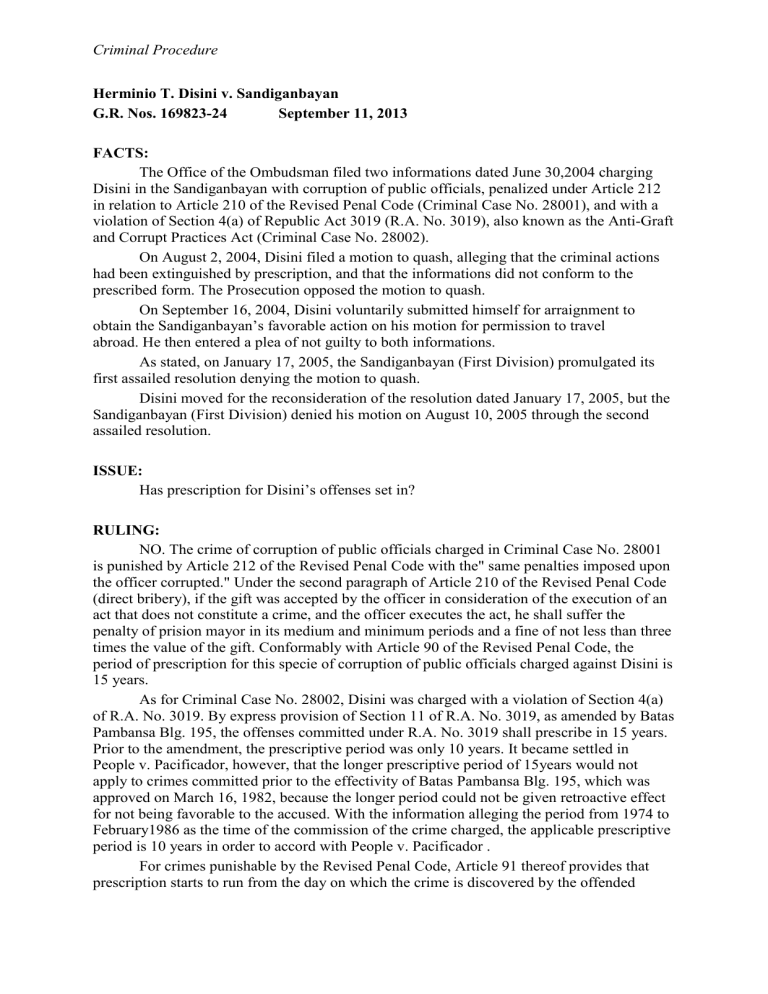
Criminal Procedure Herminio T. Disini v. Sandiganbayan G.R. Nos. 169823-24 September 11, 2013 FACTS: The Office of the Ombudsman filed two informations dated June 30,2004 charging Disini in the Sandiganbayan with corruption of public officials, penalized under Article 212 in relation to Article 210 of the Revised Penal Code (Criminal Case No. 28001), and with a violation of Section 4(a) of Republic Act 3019 (R.A. No. 3019), also known as the Anti-Graft and Corrupt Practices Act (Criminal Case No. 28002). On August 2, 2004, Disini filed a motion to quash, alleging that the criminal actions had been extinguished by prescription, and that the informations did not conform to the prescribed form. The Prosecution opposed the motion to quash. On September 16, 2004, Disini voluntarily submitted himself for arraignment to obtain the Sandiganbayan’s favorable action on his motion for permission to travel abroad. He then entered a plea of not guilty to both informations. As stated, on January 17, 2005, the Sandiganbayan (First Division) promulgated its first assailed resolution denying the motion to quash. Disini moved for the reconsideration of the resolution dated January 17, 2005, but the Sandiganbayan (First Division) denied his motion on August 10, 2005 through the second assailed resolution. ISSUE: Has prescription for Disini’s offenses set in? RULING: NO. The crime of corruption of public officials charged in Criminal Case No. 28001 is punished by Article 212 of the Revised Penal Code with the" same penalties imposed upon the officer corrupted." Under the second paragraph of Article 210 of the Revised Penal Code (direct bribery), if the gift was accepted by the officer in consideration of the execution of an act that does not constitute a crime, and the officer executes the act, he shall suffer the penalty of prision mayor in its medium and minimum periods and a fine of not less than three times the value of the gift. Conformably with Article 90 of the Revised Penal Code, the period of prescription for this specie of corruption of public officials charged against Disini is 15 years. As for Criminal Case No. 28002, Disini was charged with a violation of Section 4(a) of R.A. No. 3019. By express provision of Section 11 of R.A. No. 3019, as amended by Batas Pambansa Blg. 195, the offenses committed under R.A. No. 3019 shall prescribe in 15 years. Prior to the amendment, the prescriptive period was only 10 years. It became settled in People v. Pacificador, however, that the longer prescriptive period of 15years would not apply to crimes committed prior to the effectivity of Batas Pambansa Blg. 195, which was approved on March 16, 1982, because the longer period could not be given retroactive effect for not being favorable to the accused. With the information alleging the period from 1974 to February1986 as the time of the commission of the crime charged, the applicable prescriptive period is 10 years in order to accord with People v. Pacificador . For crimes punishable by the Revised Penal Code, Article 91 thereof provides that prescription starts to run from the day on which the crime is discovered by the offended Criminal Procedure party, the authorities, or their agents. As to offenses punishable by R.A. No. 3019, Section 2 of R.A. No. 3326 states: Section 2. Prescription shall begin to run from the day of the commission of the violation of the law, and if the same be not known at the time, from the discovery thereof and the institution of judicial proceedings for its investigation and punishment. The prescription shall be interrupted when proceedings are instituted against the guilty person, and shall begin to run again if the proceedings are dismissed for reasons not constituting double jeopardy. The prevailing rule is, therefore, that irrespective of whether the offense charged is punishable by the Revised Penal Code or by a special law, it is the filing of the complaint or information in the office of the public prosecutor for purposes of the preliminary investigation that interrupts the period of prescription. Consequently, prescription did not yet set in because only five years elapsed from 1986, the time of the discovery of the offenses charged, up to April 1991, the time of the filing of the criminal complaints in the Office of the Ombudsman.
